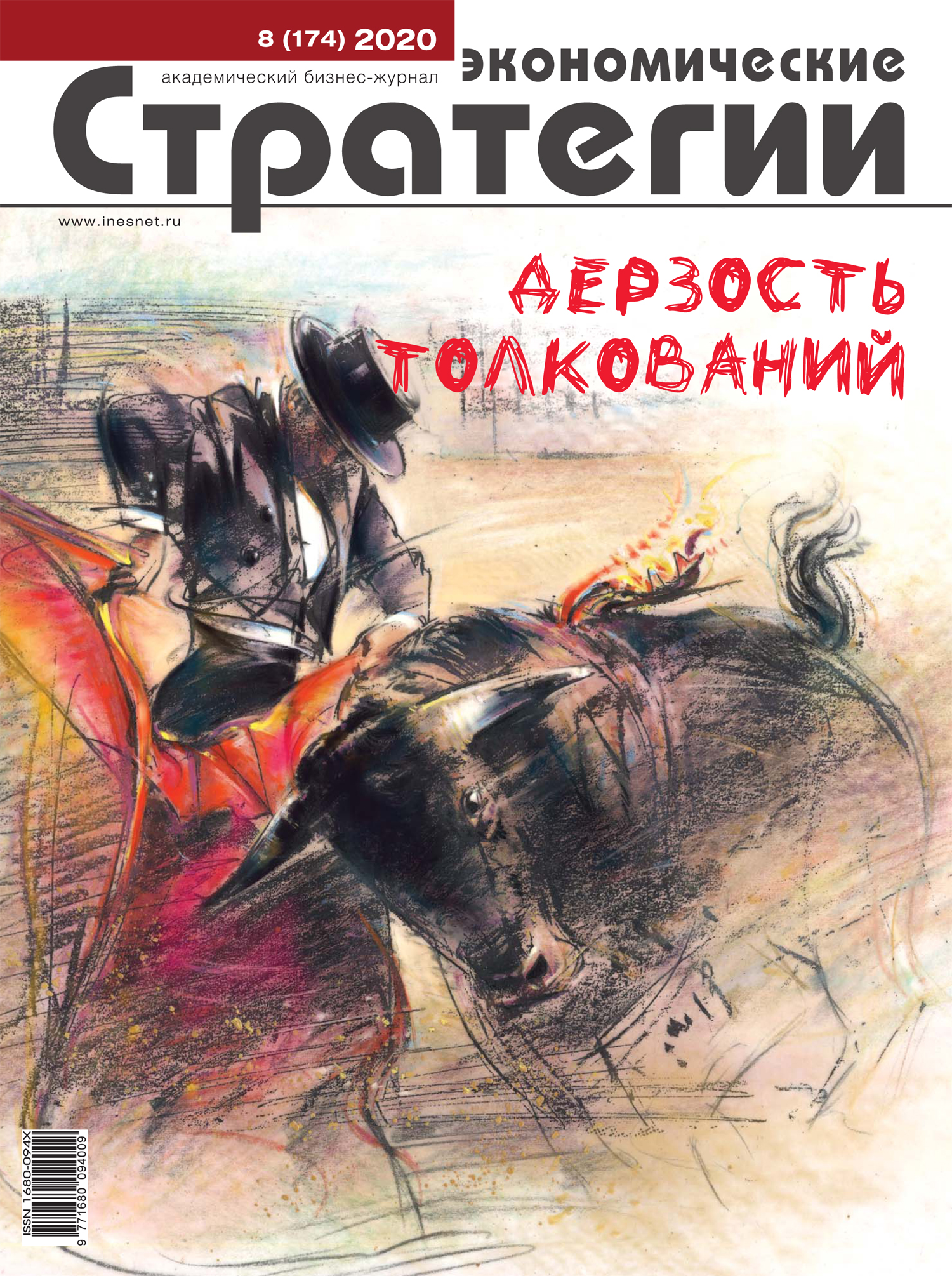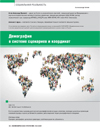Demography in the System of Scenarios and Coordinates
DOI: 10.33917/es-8.174.2020.44-55
The article examines scenarios of a long-term demographic situation and politics, evolution of the value orientations, the latest approaches to assessing the development sustainability, the dispositional theory of demographic behavior
References:
1. Ukaz Prezidenta RF ot 9 oktyabrya 2007 g. N 1351 (v red. ot 1 iyulya 2014 g.) “Ob utverzhdenii Kontseptsii demograficheskoi politiki Rossiiskoi Federatsii na period do 2025 goda” [Decree of the President of the Russian Federation of October 9, 2007 No. 1351 (as Amended on July 1, 2014) “On Approval of the Concept of the Demographic Policy of the Russian Federation for the Period Until 2025”]. Konsul’tantPlyus, available at: http://www.consultant.ru/document/cons_doc_LAW_71673/
2. The Stiglitz Report. Reforming the international monetary and financial systems in the wake of the global crisis. NY — London, New press, 2010, 204 p.
3. Medouz D., Randers I., Medouz D. Predely rosta: 30 let spustya [Limits to Growth: 30 Years Later]. Moscow, Binom, 2012, p. 39.
4. Weizsaecker E.U., von, Wijkman A. Come On! Capitalism, Short-termism, Population and the Destruction of the Planet. Springer, 2018, 220 p.
5. Bestuzhev-Lada I.V. Svozhu schety s zhizn’yu [Taking My Own Life]. Moscow, Algoritm, 2004.
6. Gelovani V.A., Britkov V.B., Dubovskii S.V. SSSR i Rossiya v global’noi sisteme (1985–2030). Rezul’taty global’nogo modelirovaniya [USSR and Russia in the Global System (1985–2030). Global Simulation Results]. Moscow, Librokom, 2009.
7. Rossiya i mir: vzglyad iz 2017 goda [Russia and the World: a View from 2017]. Moscow, Institut ekonomicheskikh strategii, 2007.
8. Ageev A.I., Kuroedov B.V. Osobennosti primeneniya metodologii strategicheskoi matritsy pri prognozirovanii razvitiya gosudarstv na primere Rossii I Kitaya [Features of Applying the Methodology of Strategic Matrix in Forecasting Development of states on the example of Russia and China]. Moscow, Institut ekonomicheskikh strategii, 2008, 296 p.
9. OON nedootsenila rossiyan: demograficheskie prognozy mezhdunarodnykh ekspertov okazalis’ pessimistichnee ofitsial’nykh [UN Underestimated Russians: Demographic Forecasts of International Experts Turned out to be More Pessimistic Than Official Ones]. RBK, available at: https://www.rbc.ru/newspaper/2019/06/24/5d0b43749a794718129aa169.
10. United Nations, Department of Economic and Social Affairs, Population Division. World Population Prospects, 2019, available at: https://population.un.org/wpp.
11. Zhuravlev A.V., Zelenov V.E. Reiting korporativnoi prozrachnosti krupneishikh kompanii RF za 2019 god [Corporate Transparency Rating of the Largest Companies in the Russian Federation for 2019]. Ekonomicheskie strategii, 2020, no 2, pp. 89–95, DOI: 10/33917/es-2.168.2020.89–95.
12. Dobrovol’nyi natsional’nyi obzor khoda osushchestvleniya Povestki dnya v oblasti ustoichivogo razvitiya na period do 2030 goda [Voluntary National Review of Implementing the Agenda for a Sustainable Development for the Period Till 2030]. United Nations, available at: https://sustainabledevelopment.un.org/
content/documents/26421VNR_2020_Russia_Report_Russian.pdf.
13. 2020–2030: Desyatiletie deistvii TsUR. Vyzovy i resheniya [2020–2030: Decade of Action for Sustainable Development Goals (SDGs). Challenges and Solutions]. KURS, available at: http://kurs2030.ru/report2020.
14. Antonov A.I., Borisov V.A. Lektsii po demografii [Lectures on Demography]. Moscow, Analiticheskii Proekt; Al’ma Mater, 2011, pp. 417–434.
15. Grushin B.A. Chetyre zhizni Rossii v zerkale oprosov obshchestvennogo mneniya. Zhizn’ 1-ya. Epokha Khrushcheva [Four Lives of Russia in the Mirror of Public Opinion Polls. The 1st Life. Era of Khrushchev]. Moscow, Progress-Traditsiya, 2001, p. 531.
16. Rozhdaemost’, smertnost’ i estestvennyi prirost naseleniya Rossii [Fertility, Mortality and Natural Population Growth in Russia]. Infotables.ru. Spravochnye tablitsy, available at: https://infotables.ru/statistika/31-rossijskaya-federatsiya/784-rozhdaemost-smertnost.
17. Piketti T. Kapital v XXI veke [Capital in the XXI Century]. Moscow, AD Marginem Press, 2015, pp. 94–95.
18. Zhiznennyi mir rossiyan: 25 let spustya (konets 1990-kh — seredina 2010-kh godov) [The Life World of Russians: 25 Years Later (Late 1990s — Mid 2010s)]. Moscow, TsSP i M, 2016, pp. 44–47.
19. Ageev A.I., Asanova E.A., Glibenko O.V., Remizov M.V., Smirnova V.A. K tsifre gotov? Otsenka adaptivnosti vysokotekhnologichnogo kompleksa Rossii k realiyam tsifrovoi ekonomiki [Ready for Digital? Assessment of the Adaptability of the High-tech Complex of Russia to the Realities of the Digital Economy]. Moscow, INES, 2018.
20. Otvetstvennost’ i vliyanie [Responsibility and Influence]. LEVADA-TsENTR, 2020, 13 oktyabrya, available at: https://www.levada.ru/2020/10/13/chuvstvootvetstvennosti/
21. Rakityanskii R.F. Opyt rassmotreniya referentsii politicheskoi mentalizatsii britanskikh elit [Experience in Considering References to the Political Mentalization of British Elites]. Vestnik Moskovskogo universiteta. Seriya 12. Politicheskie nauki, 2019, no 3, pp. 47–48.
22. Kniga proroka Ieremii (18: 15–16): Bibliya. Knigi Svyashchennogo Pisaniya Vetkhogo i Novogo Zaveta [The Book of the Prophet Jeremiah (18: 15-16): Bible. Books of Holy Scripture of the Old and New Testaments]. Sinodal’nyi perevod. Moscow, Rossiiskoe bibleiskoe obshchestvo, 2001, p. 747.
23. Gundarov I.A. Dukhovnoe neblagopoluchie kak prichina demograficheskoi katastrofy [Spiritual Ill-being as a Cause of the Demographic Catastrophe]. Bogoslov.ru, available at: https://bogoslov.ru/journal_article/214914.
24. Makarov V.L. Sotsial’nyi klasterizm [Social Clustering]. Moscow, Biznes Atlas, 2010, pp. 145, 150.



